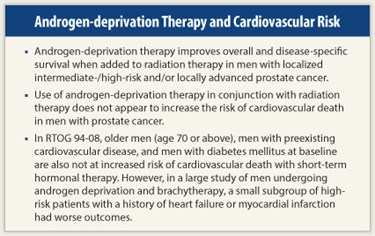Short-term androgen deprivation therapy does not appear to increase cardiovascular mortality in men with clinically localized prostate cancer, according to a post hoc analysis of a large Radiation Therapy Oncology Group (RTOG)-sponsored clinical trial.1
 “Our study analyzes data from a large randomized trial with long follow-up showing that short-term androgen-deprivation therapy improves overall survival but does not increase cardiac mortality in men with localized prostate cancer. The vast majority of men included in the trial were at a lower risk for prostate cancer–specific mortality. These findings are consistent with other analyses of large randomized controlled trials looking at cardiac mortality and androgen deprivation therapy in men with higher-risk locally advanced disease,” said lead author Jason A. Efstathiou, MD, DPhil, of Massachusetts General Hospital, Boston.
“Our study analyzes data from a large randomized trial with long follow-up showing that short-term androgen-deprivation therapy improves overall survival but does not increase cardiac mortality in men with localized prostate cancer. The vast majority of men included in the trial were at a lower risk for prostate cancer–specific mortality. These findings are consistent with other analyses of large randomized controlled trials looking at cardiac mortality and androgen deprivation therapy in men with higher-risk locally advanced disease,” said lead author Jason A. Efstathiou, MD, DPhil, of Massachusetts General Hospital, Boston.
Since October 2010, labeling for gonadotropin-releasing hormone agonists has included a black box warning to the effect that these agents increase the risk of diabetes mellitus and certain cardiovascular diseases. “Significant controversy remains surrounding the potential effects of hormonal therapy on cardiovascular death, especially in men with localized prostate cancer who are expected to live a long time,” Dr. Efstathiou explained.
Last year, RTOG 94-08 investigators reported that short-term androgen-deprivation therapy added to radiation therapy improved overall and disease-specific survival in men with intermediate-risk prostate cancer.2 That study randomly assigned more than 1,800 men with localized prostate cancer to radiotherapy plus 4 months of androgen-deprivation therapy vs radiotherapy alone and showed a survival benefit in men at intermediate risk. “This was a practice-defining trial,” Dr. Efstathiou noted. “Whether androgen deprivation therapy adds to contemporary high doses of radiation in intermediate-risk disease continues to be investigated in RTOG 0815.”
RTOG 94-08 Analysis
The present analysis, reported at the 2012 Genitourinary Cancers Symposium, showed no statistical difference in cardiovascular mortality between the two arms. Cardiovascular death occurred in 92 patients in the androgen deprivation–plus–radiotherapy arm vs 99 patients in the radiotherapy-alone arm.
 In a multivariate analysis, the following traditional cardiac risk factors were significantly related to cardiovascular mortality: age (HR = 1.06; P < .0001), existing cardiovascular disease (HR= 2.04; P < .0001), and prevalent diabetes mellitus (HR = 1.04; P = .03). Multivariate results were similar (ie, no increased cardiovascular death with androgen-deprivation therapy) when analysis was limited to the 22% of patients at high risk for cardiovascular mortality, as defined as age ≥ 70 and presence of baseline cardiovascular disease or diabetes mellitus (HR = 1.04; P = .79).
In a multivariate analysis, the following traditional cardiac risk factors were significantly related to cardiovascular mortality: age (HR = 1.06; P < .0001), existing cardiovascular disease (HR= 2.04; P < .0001), and prevalent diabetes mellitus (HR = 1.04; P = .03). Multivariate results were similar (ie, no increased cardiovascular death with androgen-deprivation therapy) when analysis was limited to the 22% of patients at high risk for cardiovascular mortality, as defined as age ≥ 70 and presence of baseline cardiovascular disease or diabetes mellitus (HR = 1.04; P = .79).
“These findings should allay some of the concern surrounding risk of cardiovascular mortality with androgen-deprivation therapy in men with localized prostate cancer. With long follow-up in a large trial, we found no such increased risk,” he stated. “All treatment decisions should ultimately be based on risk vs benefit,” he added. ■
Disclosure: Dr. Efstathiou reported no potential conflicts of interest.
Expert Point of View: Short-term Hormone Therapy Did Not Increase Risk of Cardiovascular Death in Men with Localized Prostate Cancer, RTOG 94-08 Trial Finds
References
1. Efstathiou JA, Paulus R, Smith MR, et al: Cardiovascular mortality following short-term androgen deprivation in clinically localized prostate cancer: An analysis of RTOG 94-08. 2012 Genitourinary Cancers Symposium. Abstract 18. Presented February 2, 2012.
2. Jones CU, Hunt D, McGowan DG, et al: Radiotherapy and short-term androgen deprivation for localized prostate cancer. N Engl J Med 365:107-118, 2011.

 Oliver Sartor, MD, Medical Director of Tulane Cancer Center, New Orleans, said that in his opinion, RTOG 94-08 had some flaws because outdated radiotherapy doses were employed.
Oliver Sartor, MD, Medical Director of Tulane Cancer Center, New Orleans, said that in his opinion, RTOG 94-08 had some flaws because outdated radiotherapy doses were employed.